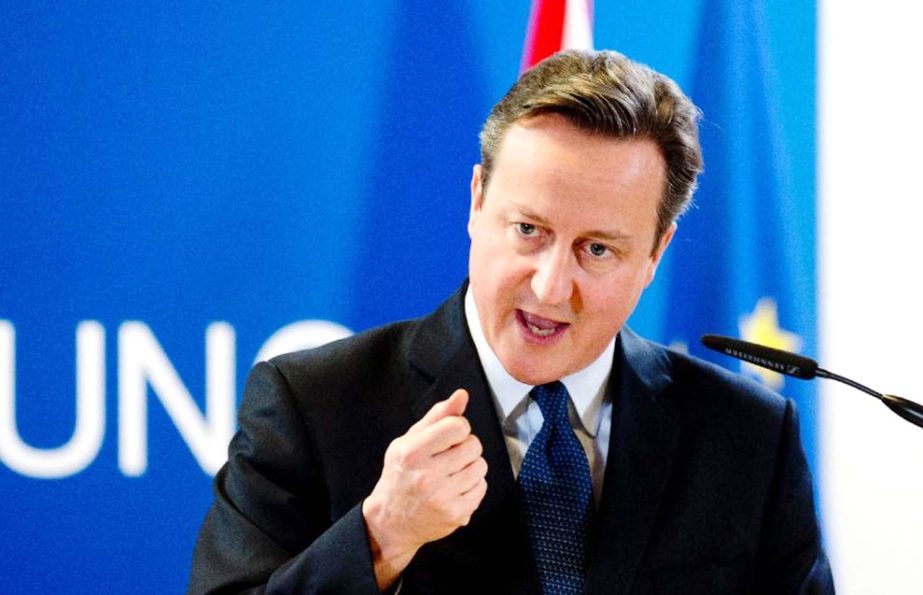
AFP, Brussels :
British Prime Minister David Cameron closed in on a difficult reform deal with European Union leaders at a summit but warned there would be hard work to seal an accord by February as hoped.
Cameron laid out his plans at a summit dinner in Brussels and appealed to them to work with him on his demands including a freeze on benefits for EU migrants, before he holds a referendum on a possible “Brexit” by the end of 2017.
“Really good progress has been made but it is going to be tough,” Cameron told a news conference after he pleaded with his counterparts to work with him on the issue.
“Nothing is certain in life or in Brussels but there is a pathway to a deal in February,” Cameron added.
EU President Donald Tusk said the other 27 leaders agreed to work for a compromise despite reservations over Cameron’s reforms after what he described as a “make or break” summit at the end of a crisis-filled year.
“I am far more optimistic than before the meeting,” Tusk, the former Polish premier, told a news conference. “Leaders voiced their concerns but also demonstrated willingness to look for compromise.”
The turnaround came just hours after both Tusk and French President Francois Hollande warned Cameron that his migrant benefit demands were “unacceptable”, with many states seeing them as discriminatory and in breach of the EU’s core ideals.
Cameron’s other reform demands — protections for countries that are not in the eurozone, an exemption from more EU integration and greater economic competitiveness — are far less problematic for his counterparts.
Germany’s powerful Chancellor Angela Merkel held open the possibility that the EU’s founding treaties could be changed at a later date to accommodate Conservative leader Cameron’s demands, which are partly driven by eurosceptics at home in Britain.
“If we need treaty changes, and I believe this could be necessary, than we all agree that they do not have to happen now but according to the British proposal that they can take place later,” Merkel said.
A similar solution — delayed treaty changes — were used to persuade Denmark to stay in the EU in 1992.
France’s Hollande however said he was opposed to treaty change.
“It seems important to me that we must not touch the treaties, and this issue must not touch the treaties because it calls free movement into question,” Hollande told a news conference.
British Prime Minister David Cameron closed in on a difficult reform deal with European Union leaders at a summit but warned there would be hard work to seal an accord by February as hoped.
Cameron laid out his plans at a summit dinner in Brussels and appealed to them to work with him on his demands including a freeze on benefits for EU migrants, before he holds a referendum on a possible “Brexit” by the end of 2017.
“Really good progress has been made but it is going to be tough,” Cameron told a news conference after he pleaded with his counterparts to work with him on the issue.
“Nothing is certain in life or in Brussels but there is a pathway to a deal in February,” Cameron added.
EU President Donald Tusk said the other 27 leaders agreed to work for a compromise despite reservations over Cameron’s reforms after what he described as a “make or break” summit at the end of a crisis-filled year.
“I am far more optimistic than before the meeting,” Tusk, the former Polish premier, told a news conference. “Leaders voiced their concerns but also demonstrated willingness to look for compromise.”
The turnaround came just hours after both Tusk and French President Francois Hollande warned Cameron that his migrant benefit demands were “unacceptable”, with many states seeing them as discriminatory and in breach of the EU’s core ideals.
Cameron’s other reform demands — protections for countries that are not in the eurozone, an exemption from more EU integration and greater economic competitiveness — are far less problematic for his counterparts.
Germany’s powerful Chancellor Angela Merkel held open the possibility that the EU’s founding treaties could be changed at a later date to accommodate Conservative leader Cameron’s demands, which are partly driven by eurosceptics at home in Britain.
“If we need treaty changes, and I believe this could be necessary, than we all agree that they do not have to happen now but according to the British proposal that they can take place later,” Merkel said.
A similar solution — delayed treaty changes — were used to persuade Denmark to stay in the EU in 1992.
France’s Hollande however said he was opposed to treaty change.
“It seems important to me that we must not touch the treaties, and this issue must not touch the treaties because it calls free movement into question,” Hollande told a news conference.

